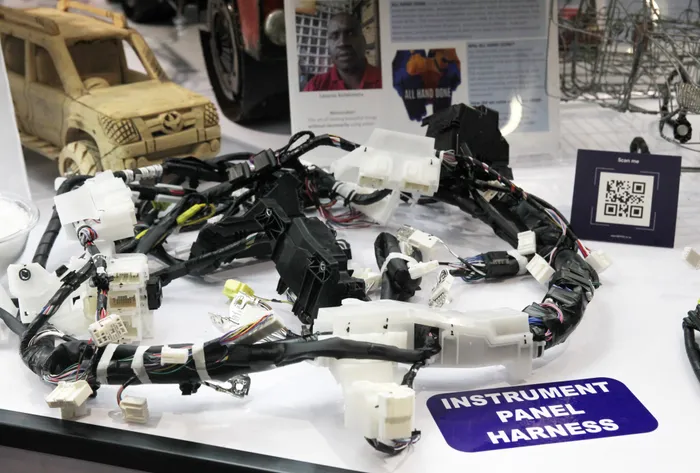Metair prepares for further volatile market conditions with the sale of its Türkiye battery subsidiary

Hesto harnesses being exhibited at a trade show. Hesto Harnesses is part of the Metair Group. Picture: Nqobile Mbonambi Independent Newspapers
Metair Investments, the international energy storage solutions and auto components group, plans to sell its Türkiye battery subsidiary Mutlu Akü to Quexco Incorporated, for $110 million (R1.89 billion), half what it paid for the company more than 10 years ago, to de-risk the group.
Metair’s share price fell 4% to R13.68 yesterday after it reported a headline loss per share of 3 cents versus a 41 cents per share profit in the same period a year before. However, in the difficult environment, the group did manage to address strategy relating to a recovery at Hesto Harnesses, debt levels in South Africa and the sale of Mutlu.
Metair had acquired Mutlu in October 2013 for $270m and it was a very good manufacturer of batteries, but the high interest rates in Türkiye was creating debt in Mutlu with 80% of its costs in dollars, while only 20% of its sales was in dollar denominated exports, CEO Paul O’Flaherty said in an online interview.
“We are committed to a more sustainable capital structure through optimising and deleveraging debt. The proposed sale of Mutlu is critical in the plan as it removes our exposure to hyperinflationary pressures in Türkiye and provides the proceeds to restructure debt in the local operations,” said Anesh Jogia, CFO of Metair.
Hesto’s balance sheet would be restructured, after turning around from an interim loss to a profit, to introduce longer-term external funding from lenders, to align to a project financing methodology.
Group revenue increased 4% to R8bn. Total automotive battery volumes sold in the Energy Storage business improved 10%, up 358 000 units to 3.9 million units, supported by stronger aftermarket and export sale volumes.
Overall vehicle production volumes were 7% softer, temporarily impacted by reduced demand from Toyota South Africa Motors, due to engine certification challenges faced globally by Toyota Motor Corporation. O’Flaherty said he expected the weak vehicle sales market would continue for the rest of the year.
However, production volume issues at Toyota were expected to resolve in the short term with production volumes to resume to normal levels.
“By focusing on production agility and stability, improving profitability and enhancing liquidity within Hesto, we’ve managed to make positive progress in our strategy. Both business verticals performed resiliently relative to their challenging operating conditions and maintained constant supply to customers,” he said.
The Automotive Components business (including Hesto) generated revenue of R6.2bn with EBIT (earnings before interest and tax) of R308m, a strong recovery from the prior comparative period loss of R448m.
Hesto recovered from the previously reported challenging model ramp-up, to deliver an EBIT of R112m, from a loss of R711m previously.
Hesto’s operational recovery had followed Ford’s volumes progressing in line with expectations, and close collaboration between Hesto, its customers and technology partner, said O’Flaherty.
In Türkiye annual inflation increased to 71.6%. Against this, the Energy Storage Vertical’s revenue increased 23% to R4.6bn, but EBIT fell to R6m from R121m as a result of non-operational hyperinflation accounting. Pre-hyperinflation, revenue increased by 12% to R4.5bn and EBIT was R392m.
Rombat S.A in Romania benefited from market gains in exports and aftermarket, with a 41% improvement in automotive volumes to 1.3 million batteries, and an EBIT of R20m compared with an R11m loss in the comparative period. First Battery volumes were impacted by competitive pressures; however, increased focus on product mix and improved manufacturing efficiencies saw the business lift its EBIT to R152m from R83m.
A debt restructure plan was approved by the board for the proposed refinance and ring-fencing of the South African operations only, in order to rebalance and recapitalise Hesto debt.
O’Flaherty said they needed to focus on being increasingly agile operationally to cope with the fast-changing market conditions in the automotive industry.
BUSINESS REPORT
Related Topics: